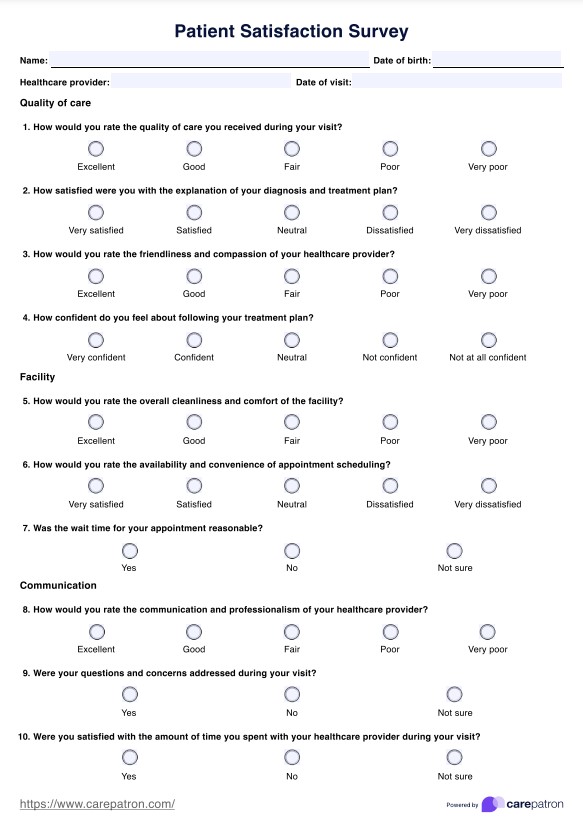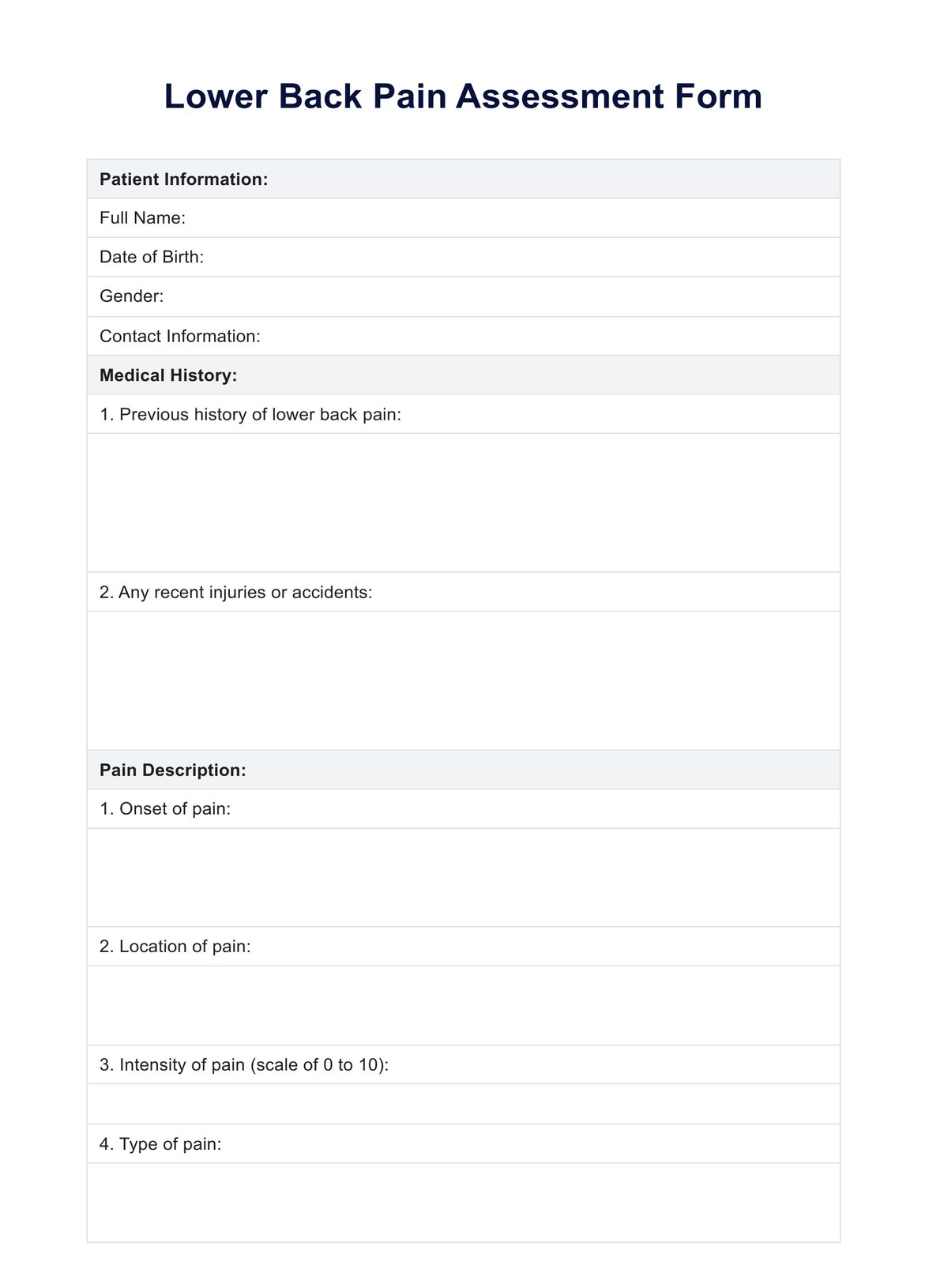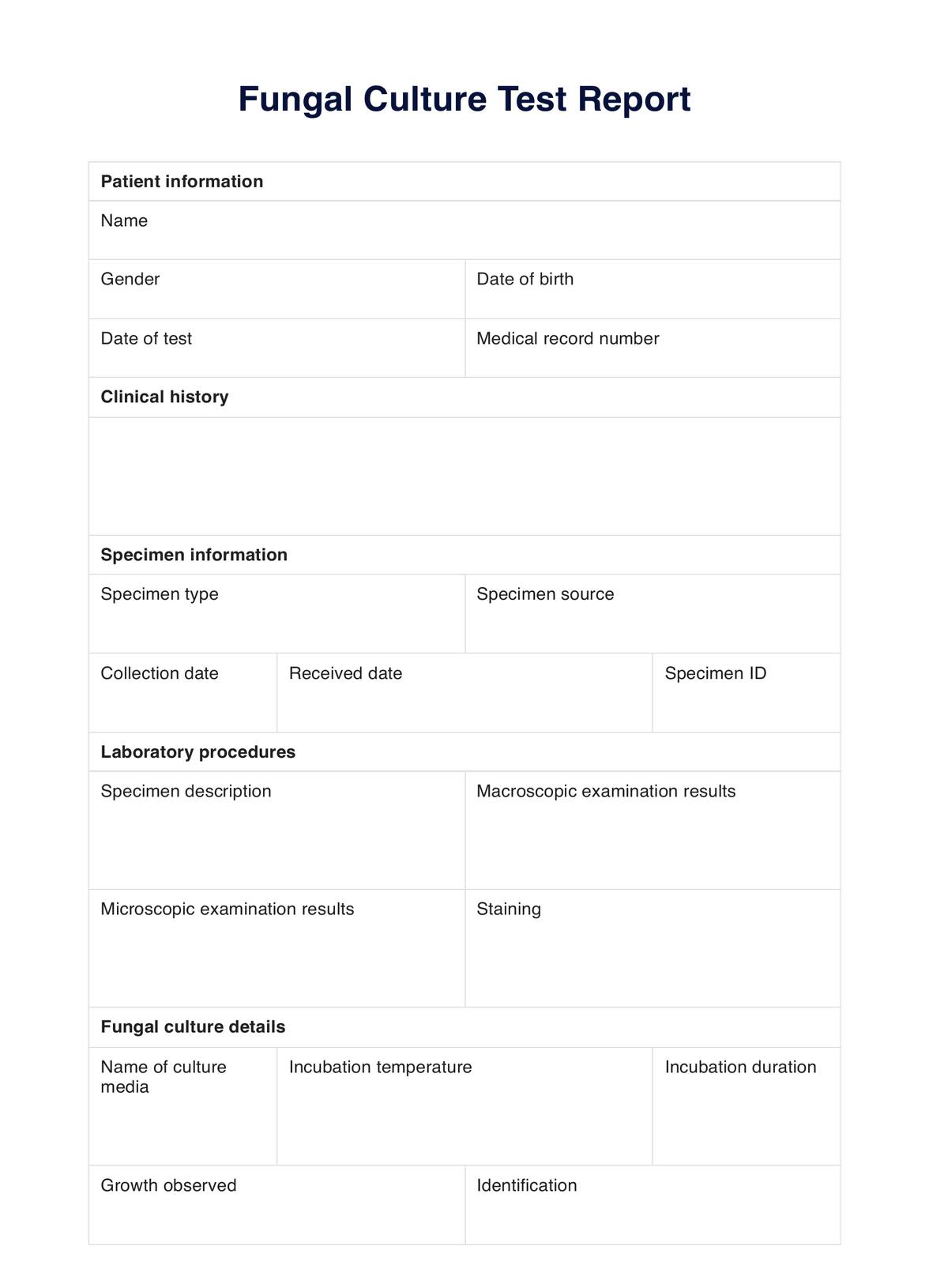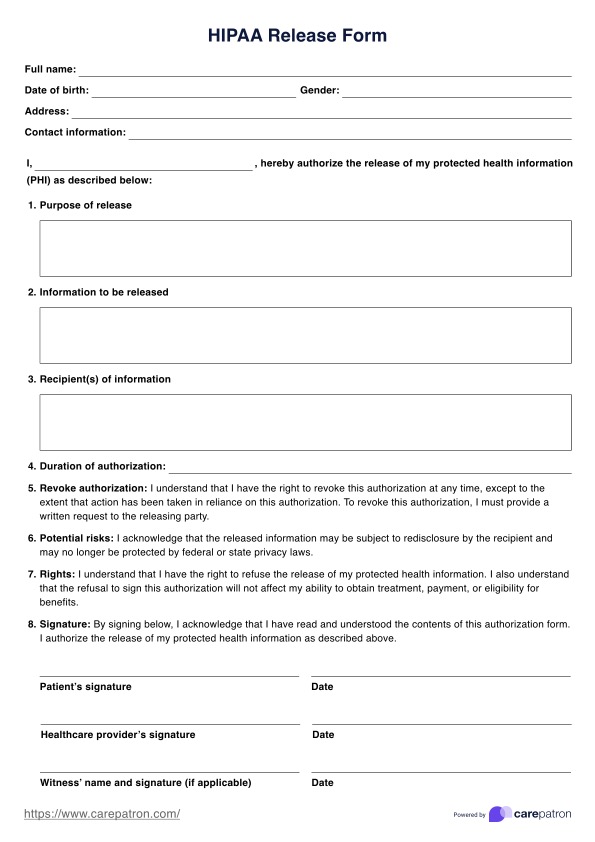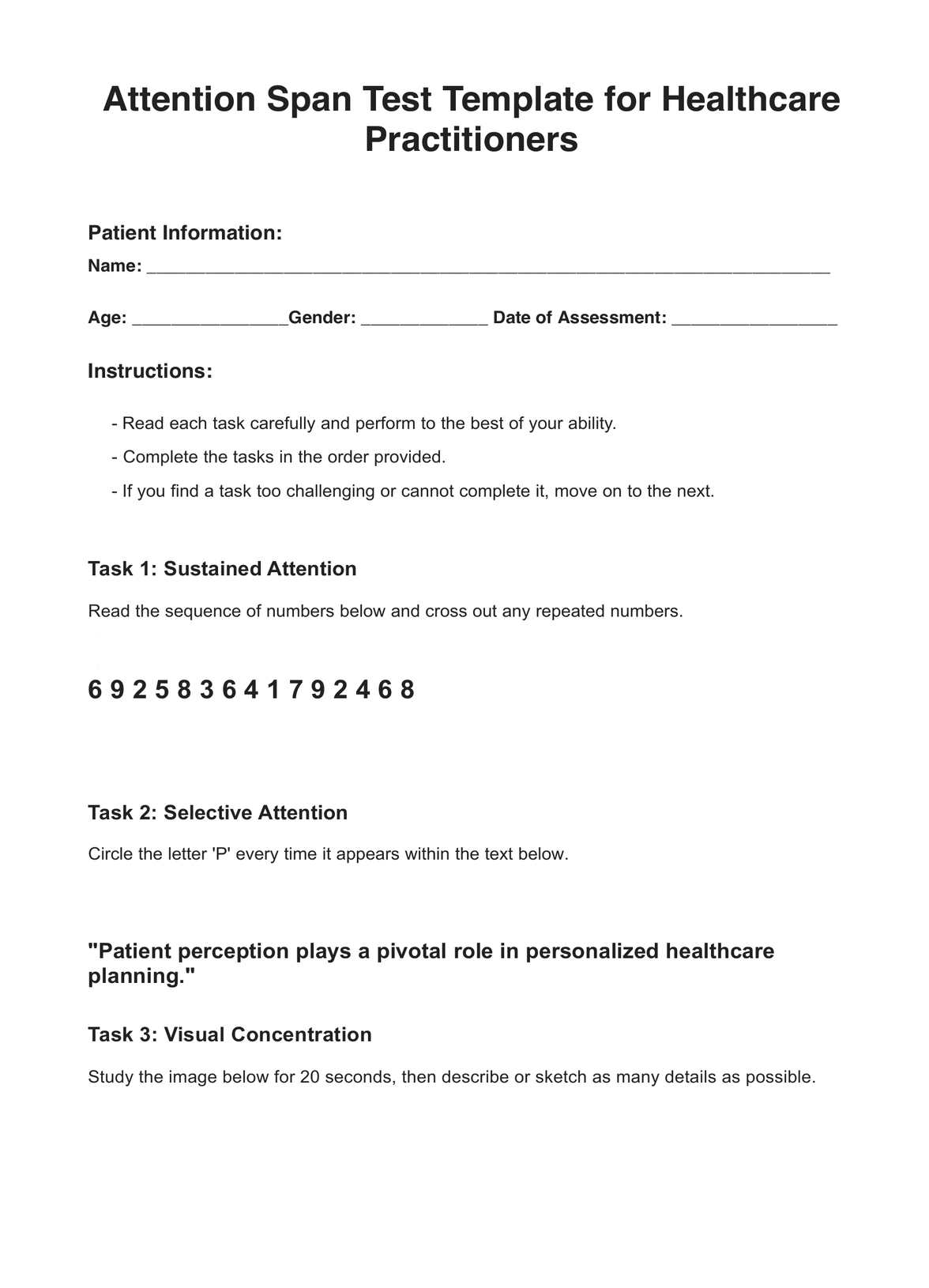Albumin Blood Test
Dive into the intricacies of the Albumin Blood Test with Carepatron's comprehensive guide and discover why it's a must-have in modern diagnostics.


What Is An Albumin Blood Test?
Hey there, health enthusiast! Have you ever stumbled upon your medical report and wondered about those numbers next to the term 'Albumin'? Or perhaps, as a healthcare professional, you need a concise way to explain the Albumin Blood Test to your patients. Whatever the case, you've landed in the right place!
Albumin is more than just a fancy term from the medical realm. It's a critical protein made by the liver, and it serves many pivotal roles in our body, from maintaining the growth and repair of tissues to transporting essential hormones and vitamins. But how do we know if our liver is churning the right amount? Enter the .
This straightforward blood test does precisely what its name suggests—it measures the albumin level in your blood. A peek into these levels can give insights into your liver's health, nutrition status, and even hint at certain underlying conditions. But, like any other test, the results need to be decoded. And that's precisely what this guide is here for! By the end of this journey, you'll have a crystal-clear understanding of the Albumin Blood Test and its significance in maintaining our health.
So, grab a cup of your favorite beverage, get cozy, and dive deeper into the world of albumin!
Albumin Blood Test Template
Albumin Blood Test Example
How To Use the Albumin Blood Test
Navigating the domain of medical diagnostics can often feel like decoding a complex puzzle. The Albumin Blood Test, while common, requires a few precise steps to ensure accuracy and reliability. Below, we've detailed a step-by-step guide for healthcare professionals to administer this pivotal assessment efficiently.
1. Patient Preparation
Before administering the test, it's vital to:
- Inform the patient about the nature and purpose of the test.
- Ensure the patient has fasted for at least 6 hours before the test, as food can affect albumin levels.
- Inquire about their medications or supplements, as some can influence albumin levels.
2. Sample Collection
- Clean the venipuncture site using an alcohol swab.
- Insert a sterile needle into the patient's vein, typically in the arm.
- Draw a blood sample into a vacuum tube.
- Label the tube with the patient's information.
3. Laboratory Analysis
- Use the bromocresol green method or an equivalent for accurate albumin measurement.
- Ensure the sample is stored and transported under recommended conditions to prevent hemolysis.
4. Interpretation of Results
- Compare the patient's results with the normal range (typically 3.4 to 5.4 g/dL).
- Elevated or decreased levels might indicate various conditions or diseases; thus, always consider the patient's overall health and medical history.
5. Follow-Up
- Inform the patient of their results promptly.
- Recommend a follow-up appointment if results are abnormal or other diagnostics are necessary.
- Offer guidance on lifestyle or dietary changes if low or high albumin levels are detected.
In the grand orchestra of diagnostics, the Albumin Blood Test plays an instrumental role in decoding one's health, particularly concerning liver function and nutritional status. By ensuring a systematic and informed approach to this test, healthcare professionals can promise the most accurate results for their patients, enabling timely and appropriate medical interventions.
When Would You Use This Form?
The Albumin Blood Test is an essential diagnostic tool in the medical realm. Still, its utilization is most effective when appropriately timed and applied. Knowing when to use the Albumin Blood Test form can significantly enhance diagnostic accuracy and patient care.
- Routine Health Screenings: One of the most common occasions for this test is during annual physical exams. As albumin levels offer insights into overall liver and kidney function, it is a primary metric for general health.
- Monitoring Chronic Liver Diseases: Patients diagnosed with liver conditions such as cirrhosis, hepatitis, or other chronic liver diseases often require regular monitoring of their albumin levels to assess the progression or control of the disease.
- Assessing Nutritional Status: Malnutrition, both from dietary insufficiency or absorption issues, can decrease albumin levels. The test aids in evaluating the nutritional health of patients, particularly those with disorders that might impair nutrient absorption.
- After Significant Weight Loss: Rapid weight loss can affect albumin levels; using this form after a significant weight drop can help understand its impact on the body.
- Checking Kidney Function: Apart from liver-related concerns, abnormal albumin levels, especially its presence in urine, can indicate kidney problems. Regular tests are, therefore, essential for patients with known kidney disorders.
- Post-surgery or Major Illness: Doctors might use the Albumin Blood Test form to monitor recovery and organ function following surgeries, especially those related to the liver or kidney or after significant illnesses.
The Albumin Blood Test form is a multifunctional resource, apt for various medical scenarios. Its versatility and significance underline its prominence in patient care. Ensuring you use it correctly can provide a holistic view of your patient's health, leading to informed, effective treatments.
Benefits
Understanding the advantages of the Albumin Blood Test form is crucial for healthcare practitioners. This tool streamlines the diagnostic process and ensures accuracy and comprehensiveness. Here are some significant benefits of utilizing this template:
Simplified Data Collection
The template's structured format ensures that every essential detail, from patient information to medical history, is meticulously captured. This organized approach simplifies data collection, ensuring no critical information is overlooked.
Enhanced Patient-Practitioner Communication
With clear sections and prompts, the form acts as a conversation starter, encouraging patients to discuss their health concerns openly, leading to a more comprehensive understanding of their condition.
Efficient Diagnosis Process
Having a standardized form can speed up the diagnostic process. It ensures all required details are readily available, helping medical professionals make accurate diagnoses faster.
Comprehensive Medical History Recording
The detailed sections on medical history provide a clear timeline of a patient's health. This historical context can be invaluable in understanding current health conditions and predicting potential future complications.
Improved Patient Care
With organized and complete data, healthcare practitioners can offer more personalized care plans tailored to individual patient needs, improving overall patient outcomes.
Streamlined Documentation
For medical facilities, keeping systematic records is crucial. This template ensures consistent documentation across patients, making record-keeping and data retrieval more efficient.
Incorporating the Albumin Blood Test form into regular diagnostic practices can enhance patient care quality, making it an invaluable tool for all healthcare practitioners.
Research & Evidence
The Albumin Blood Test, a diagnostic tool recognized for its precision and reliability, has evolved over the years, backed by extensive research and scientific evidence. Albumin, a protein made by the liver, is essential for many bodily functions, including nutrient transport and maintaining osmotic pressure balance between blood and interstitial fluid. Its levels can reflect a patient's nutritional status and the liver's synthetic capacity.
Historically, albumin blood tests have been employed for decades, highlighting their importance in multiple studies. These studies emphasized the test's efficacy in diagnosing various conditions, such as liver diseases, nutritional deficiencies, and kidney disorders. Furthermore, research consistently shows abnormal albumin levels can indicate more severe underlying health issues.
Recent advancements in diagnostic technologies have further improved the accuracy and speed of albumin blood tests, making them an even more invaluable tool in modern medicine. Numerous peer-reviewed journals and articles have highlighted albumin tests' critical role in diagnostic and prognostic settings.
It's essential to mention that the evidence supporting the use of the Albumin Blood Test is more than just its diagnostic capabilities. The test also holds prognostic value, guiding treatment approaches and management strategies, especially in patients with chronic conditions.
To sum it up, the Albumin Blood Test is backed by years of research, making it a gold standard in diagnostic medicine. Its ability to provide crucial insights into a patient's health status underlines its indispensability in medicine.
References
- Ballmer, P. E. (2001). Causes and mechanisms of hypoalbuminaemia. Clinical Nutrition, 20(3), 271-273.
- Nicholson, J. P., Wolmarans, M. R., & Park, G. R. (2000). The role of albumin in critical illness. British Journal of Anaesthesia, 85(4), 599-610.
- Levitt, D. G., & Levitt, M. D. (2016). Human serum albumin homeostasis: a new look at the roles of synthesis, catabolism, renal and gastrointestinal excretion, and the clinical value of serum albumin measurements. International journal of general medicine, 9, 229.
Commonly asked questions
The Albumin Blood Test is pivotal as it helps determine the liver's function and potential nutritional deficiencies and can indicate various health issues like kidney disorders.
Carepatron prioritizes user security, employing advanced encryption technologies and adhering to stringent data protection guidelines to ensure your results remain confidential and safe.
Absolutely! Carepatron's analytical tools evaluate your test results, providing real-time insights and trends that aid healthcare professionals in making informed decisions.


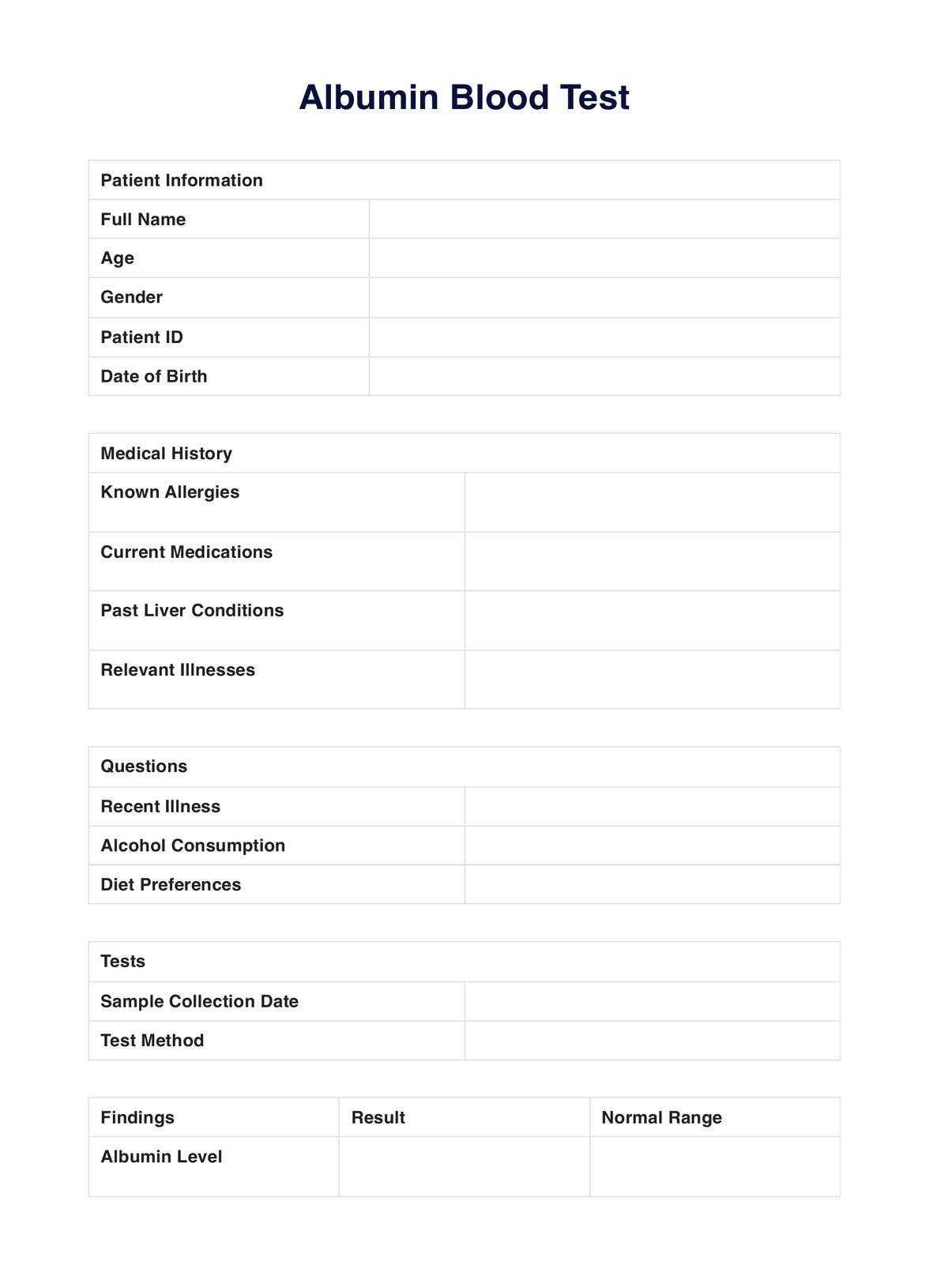
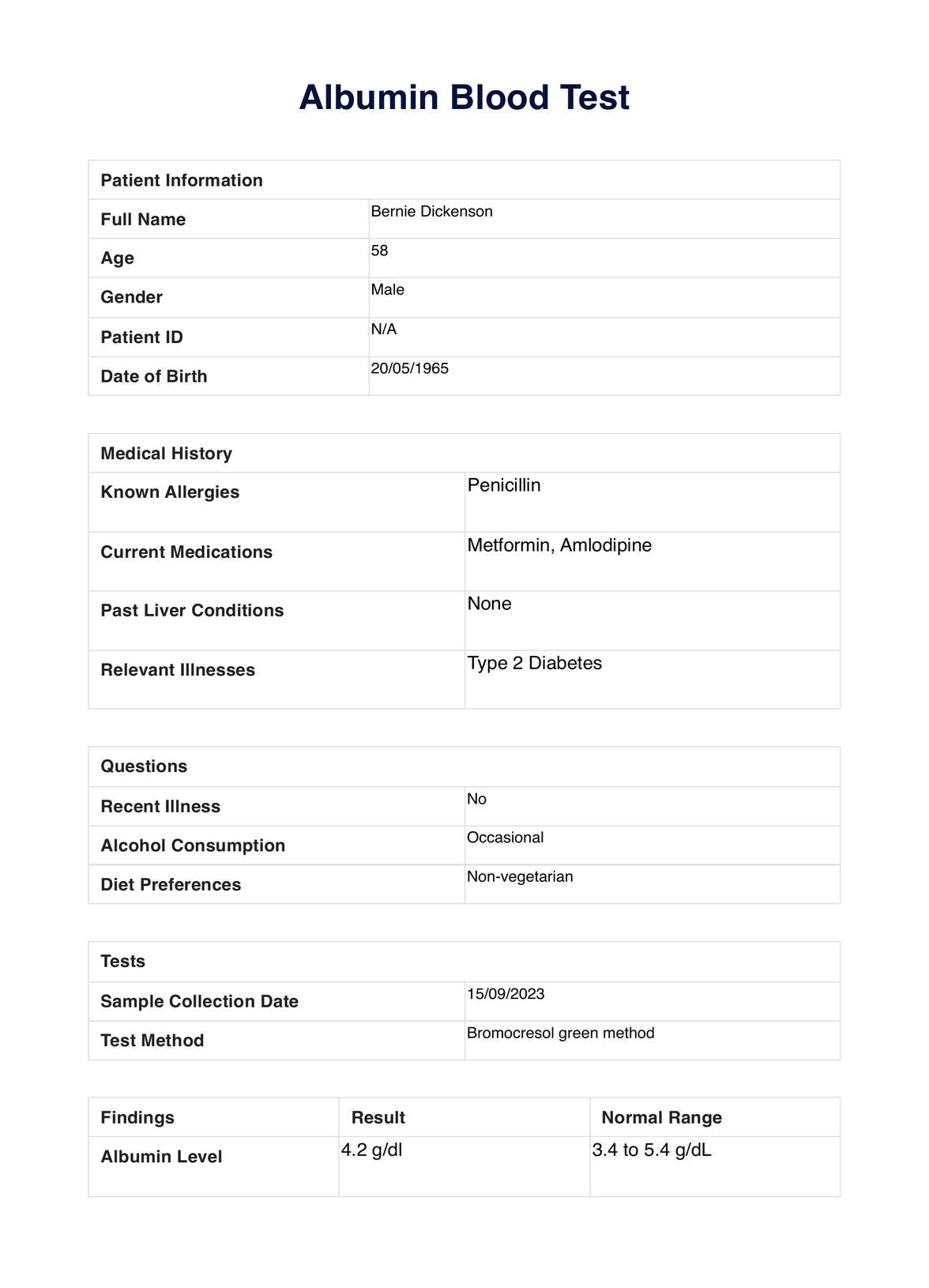


















-template.jpg)



















































































